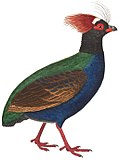Scrubfowl
| Scrubfowl | |
|---|---|
 | |
| Orange-footed scrubfowl | |
| Scientific classification | |
| Domain: | Eukaryota |
| Kingdom: | Animalia |
| Phylum: | Chordata |
| Class: | Aves |
| Order: | Galliformes |
| Family: | Megapodiidae |
| Genus: | Megapodius Gaimard, 1823 |
| Type species | |
| Megapodius freycinet[1] Gaimard, 1823 | |
| Species | |
| 14 total, 12 extant, see text. | |
The scrubfowl are the genus Megapodius of the mound-builders, stocky, medium-large chicken-like birds with small heads and large feet in the family Megapodiidae. They are found from south-east Asia to north Australia and islands in the west Pacific.
They do not incubate their eggs with their body heat in the orthodox way, but bury them. They are best known for building a massive mound of decaying vegetation, which the male attends, adding or removing litter to regulate the internal heat while the eggs hatch. The species in taxonomic order are:
| Image | Scientific name | Common Name | Distribution |
|---|---|---|---|
| Megapodius pritchardii | Tongan megapode | Tonga | |
 | Megapodius laperouse | Micronesian megapode | Palau and the Northern Mariana Islands, Guam |
| Megapodius nicobariensis | Nicobar megapode | Nicobar Islands (India) | |
 | Megapodius cumingii | Philippine megapode | The Philippines, northeastern Borneo, and Sulawesi |
| Megapodius bernsteinii | Sula megapode | Banggai and Sula Islands between Sulawesi and the Maluku Islands in Indonesia | |
| Megapodius tenimberensis | Tanimbar megapode | Tanimbar Islands of Indonesia | |
| Megapodius freycinet | Dusky megapode | Maluku and Raja Ampat Islands in Indonesia. | |
| Megapodius geelvinkianus | Biak scrubfowl | Biak, Mios Korwar, Numfor, Manim and Mios Numin in the West Papua region of Indonesia. | |
| Megapodius eremita | Melanesian megapode | Bismarck Archipelago (Papua New Guinea) and the Solomon Islands. | |
| Megapodius layardi | Vanuatu megapode | Vanuatu | |
| Megapodius decollatus | New Guinea scrubfowl | Northern New Guinea and adjacent islands | |
 | Megapodius reinwardt | Orange-footed scrubfowl | Lesser Sunda Islands as well as southern New Guinea and northern Australia. |
- †Pile-builder scrubfowl (Megapodius molistructor)
- †Viti Levu scrubfowl (Megapodius amissus)
In all of the above, the name "scrubfowl" is sometimes exchanged with "megapode". Traditionally, most have been listed as subspecies of M. freycinet, but today all major authorities consider this incorrect. Nevertheless, there are unresolved issues within the genus, and for example the taxon forstenii has been considered a subspecies of M. freycinet, a subspecies of M. cumingii, or a monotypic species. An additional species, the Moluccan megapode, has sometimes been placed in Megapodius, but today most place it in the genus Eulipoa instead. The maleo is also associated with these genera, and together the three form a group.
References
[edit]- ^ Peters, JL (1934). Check-list of birds of the world. Vol. 2. Cambridge, Massachusetts: Harvard University Press. pp. 3–7.
External links
[edit]- Mound-builders videos on the Internet Bird Collection


 French
French Deutsch
Deutsch


